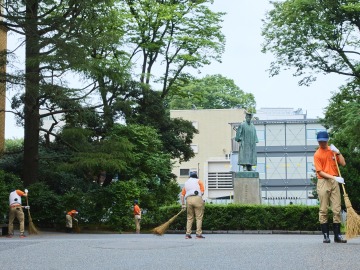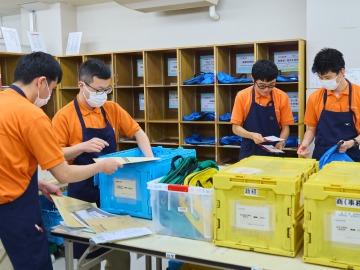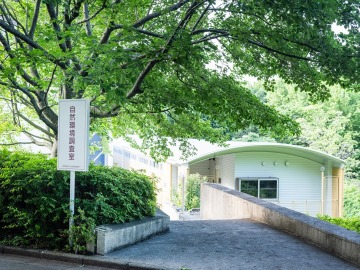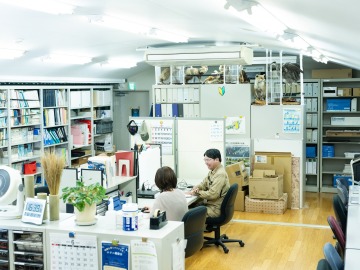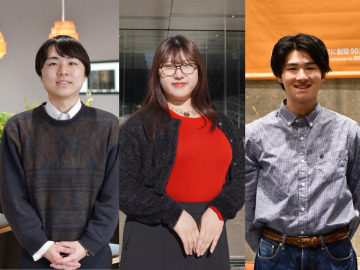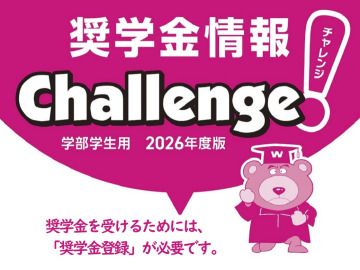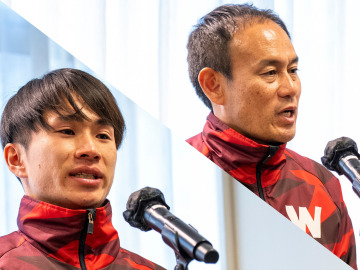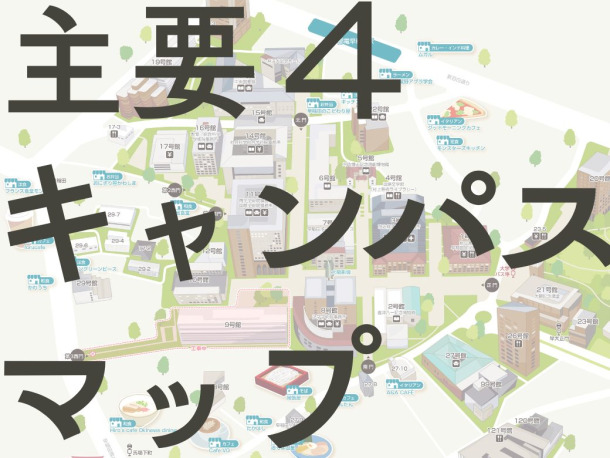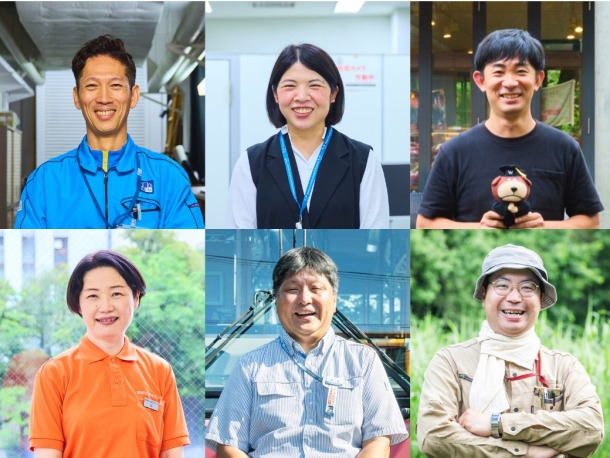
早稲田大学では大学院生を含め約5万人の学生が在籍し、約5,000人の教員と1,000人を超える職員が学生生活を支えています。高校までとは規模も機能も桁違いの大学キャンパスで働く人々の仕事は多種多様。そこで、2024年のフォーカスでも特集した、大学を運営する上でかけがえのない人々を、「仕事の相棒」と共に今年も紹介します。今回は代表して、大隈記念講堂の管理員やオンデマンド授業の陰の支え手、また所沢キャンパスからは連絡バスの運転士など、6名の名脇役たち。さまざまな形で早稲田大学に関わる人々の、普段は聞けない心の内をのぞいてみましょう!
INDEX
▼舞台裏のプロフェッショナル 大隈記念講堂管理員
▼早稲田の学びを支える、Waseda Moodleコンシェルジュ
▼グッズ販売とカフェ運営 早稲田のブランドマネージャー
▼障がい者スタッフの活躍を支える、「ポラリス」の要
▼所沢キャンパスをつなぐ19台の連絡バス 安全・安心の運転士
▼自然との共生 環境保全の最前線で働く専門職員
舞台裏のプロフェッショナル 大隈記念講堂管理員
大隈記念講堂 管理員 五十嵐 達也(いがらし・たつや)
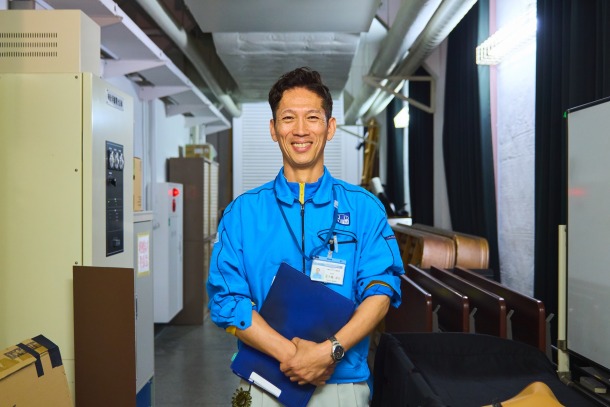
早稲田キャンパス 大隈記念講堂舞台袖通路にて
――業務内容を教えてください。
出勤すると、まずその日のイベント開催に向け、館内の空調システムや各種AVシステムの立ち上げ、使用箇所の解錠、照明の点灯を行います。その後、開催担当者がいらしてからは、イベントが成功するようにお手伝い。開催中も万が一のトラブルに即座に対応できるよう、管理事務所内にあるライブ映像画面やマイク音声を通して進行を見守りながら待機しています。イベント終了後は撤収作業のサポートをしつつ、原状復帰の確認です。
――普段、学生に対してどのようなことを思いながら働いていますか?
大隈記念講堂ではサークルの新歓イベントや早稲田祭、卒業イベントなどで多くの学生と接します。演者として舞台に立つ人と裏から支える人、異なる立場で力を合わせてイベントを作り上げていく姿から良い刺激をたくさんもらっていますが、皆さんの全力で取り組む姿を間近に見ることで、私自身も初心を忘れず、全力で仕事に打ち込む大切さを学べています。
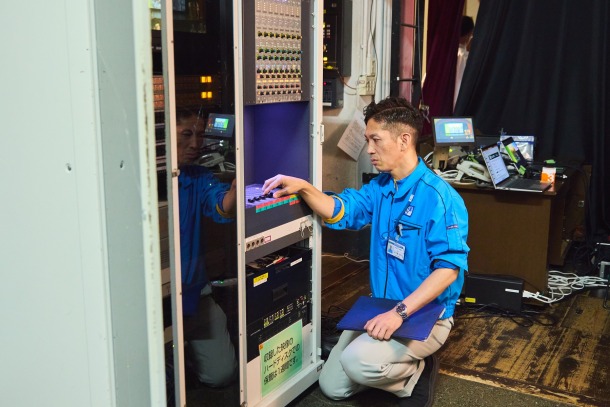
大隈記念講堂舞台袖にて、音響機材の調整をしているところ
――仕事をしていて、どんなときにやりがいを感じますか?
早稲田大学の象徴的な建物であり、国の重要文化財でもある大隈記念講堂では、年間を通して多くの重要なイベントが行われますが、その舞台となる建物を管理し、守っていく仕事はとてもやりがいがあります。毎年行われる『狂言の夕べ』や早稲田祭などの素晴らしいイベントを無事に開催できたとき、その関係者の方々にねぎらいの言葉をいただけたときに、この仕事をとても誇らしく感じます。
――学生に向けてメッセージをお願いします。
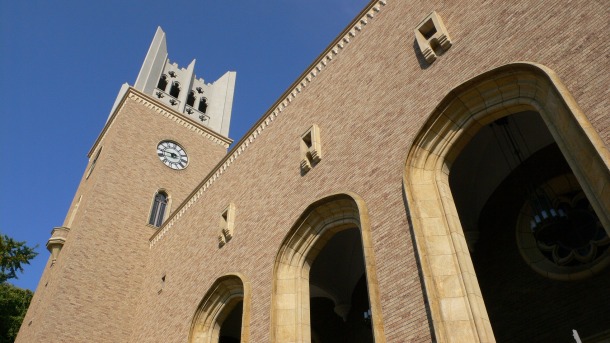 サークルなどで利用する際には、少し窮屈に感じるルールもあるかもしれませんが、重要文化財である大隈記念講堂を守り、皆さんの大切なイベントを安全に行うために必要なことなので、協力をお願いします。そして早稲田大学という舞台で、かけがえのない仲間たちと、精いっぱい全力ですてきな思い出を作ってください!
サークルなどで利用する際には、少し窮屈に感じるルールもあるかもしれませんが、重要文化財である大隈記念講堂を守り、皆さんの大切なイベントを安全に行うために必要なことなので、協力をお願いします。そして早稲田大学という舞台で、かけがえのない仲間たちと、精いっぱい全力ですてきな思い出を作ってください!
「仕事の相棒」:必要書類を携帯するための「バインダー」

「イベント開催担当者との事前打ち合わせや下見、そして当日に持ち歩いています。酷使し過ぎて変色しているので早く買い替えた方が良いのでしょうが、これだけ使っていると愛着もあり、なかなか別れられません」(五十嵐さん)
早稲田の学びを支える、Waseda Moodleコンシェルジュ
株式会社早稲田大学アカデミックソリューション IT推進部コンテンツ企画チーム
千葉 珠希(ちば・たまき)
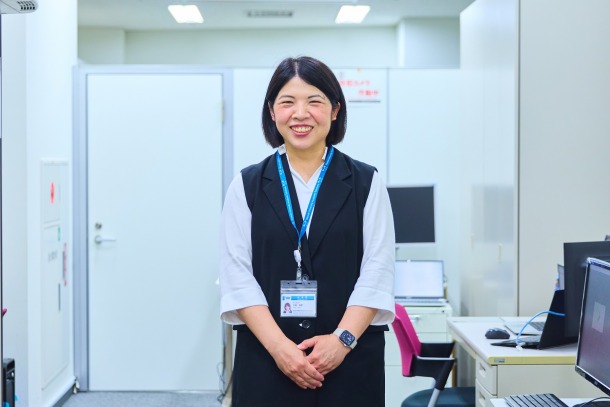
早稲田キャンパス 26号館地下1階 スタジオ準備室にて
――業務内容を教えてください。
株式会社早稲田アカデミックソリューションという早稲田大学のグループ会社に所属し、オンデマンド授業支援に携わっています。スタジオ収録の立ち会い、Waseda Moodleの設定・チェック、先生方からの質問対応など、業務はさまざま。また、より良い授業配信のため、先生方による動画作成を支援するセミナーの企画・開催も。さらに、Waseda Moodleに蓄積された受講データを分析し、授業改善につなげる提案も行っています。

Moodleは世界中で広く使われている学習管理システム(LMS)で、Waseda Moodleは早稲田大学用にカスタマイズされたもの
――普段、学生に対してどのようなことを思いながら働いていますか?
皆さんと直接お会いする機会はほとんどありません。だからこそ、画面の向こう側で真剣に学ぶ一人一人の姿を想像しながら仕事をしています。裏方として学習環境を整える私の仕事は、一つ一つが皆さんの大切な学びにつながっていると信じ、その学びを陰ながら全力で応援したいという気持ちで日々の業務に取り組んでいます。
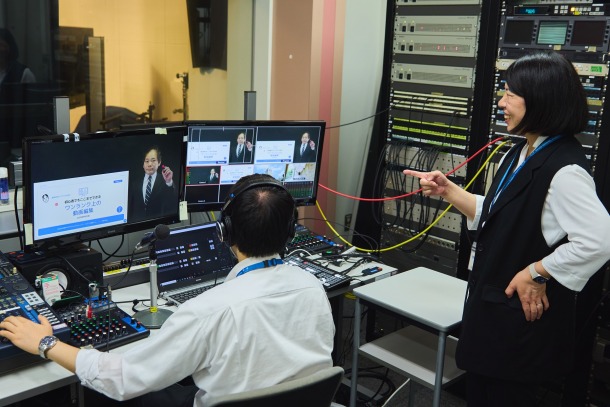
スタジオにて、動画収録を見守る千葉さん(右)
――仕事をしていて、どんなときにやりがいを感じますか?
まず、学生に最良の教育を届けようと、奮闘する先生方の熱意あふれるご相談に触れる瞬間に大きなやりがいを感じます。次に、「学生からこんな要望が…」といったお悩みに対し、私の知識やスキルでお応えできたとき。そして何より、後日先生から「おかげで学生の反応がとても良かったよ!」とご報告いただき、自分の仕事が先生を通して学生の皆さんに届いたと実感できたとき、この仕事をしていて本当に良かったと思います。
――学生に向けてメッセージをお願いします。
大学には皆さんの知的好奇心を刺激してくれる素晴らしい先生がたくさんいます。「面白い」「もっと話を聞きたい」と思った先生に、ぜひ勇気を出して質問してみてください。その一歩は大学での学びを何倍も豊かにしてくれるでしょうし、きっと先生にとっても、単位の嘆願をされるよりもずっとうれしいコミュニケーションだと思います。
「仕事の相棒」:PCデスクトップ画像にしている、愛犬の写真入り「自作授業カレンダー」
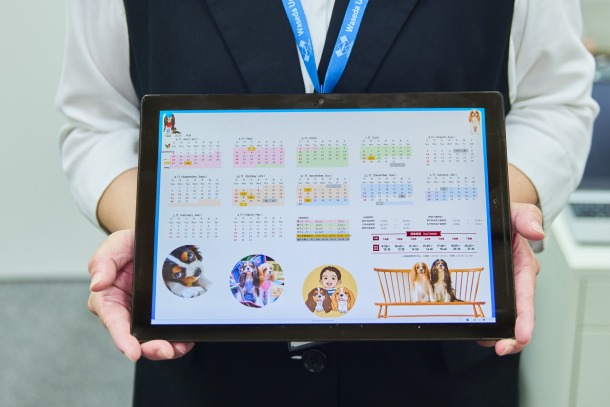
「大学の複雑な授業日程による配信設定ミスを防ぐだけでなく、疲れたときには愛犬が心を和ませてくれ、仕事の正確さと心の平穏、両方の支えになっています」(千葉さん)
グッズ販売とカフェ運営 早稲田のブランドマネージャー
Uni.Shop & Café 125 マネージャー 梶原 昂也(かじわら・こうや)
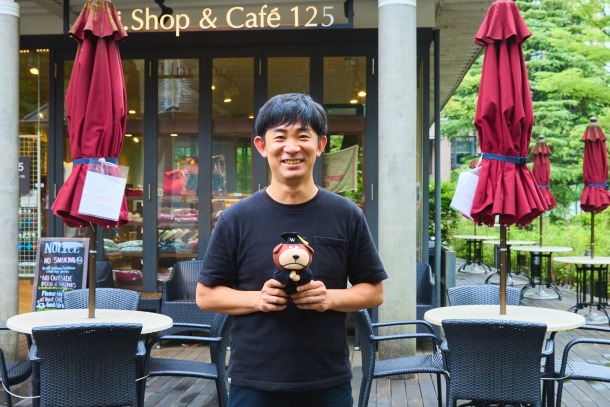
早稲田キャンパス Uni.Shop & Café 125前にて
――業務内容を教えてください。
出社後、店舗へ寄ってスタッフと顔を合わせるところから1日が始まります。その後は商品管理をしている倉庫でWASEDA-SHOP(オンラインショップ)の在庫補充作業。それが終わると、オフィシャルグッズの企画、製造、販売に関わる作業などのデスクワークに移り、午後は再び店舗で業務に従事することが多いです。お客さまの様子や来店動向を見たり、スタッフの要望や相談に応じたりする他、手薄な所のフォローに入るなど、表から裏まで何でもやります。
――普段、学生に対してどのようなことを思いながら働いていますか?
近年はSNSなど対面でなくてもコミュニケーションが取れる便利な社会になっていますが、直接相手と話すことでしか伝えられなかったり、得られなかったりする感情があると思います。今後社会へ出ていくと、学生時代の友人の存在はとても大きいです。そういった人間関係の構築を、Uni.Shop & Café 125での買い物やカフェタイムで作り上げていってほしいです。
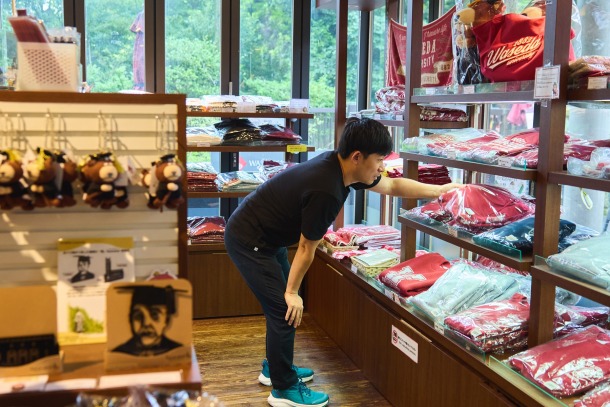
Uni.Shop 125で商品陳列を行っている様子
――仕事をしていて、どんなときにやりがいを感じますか?
Uni.Shop & Café 125に来店する方々の「早稲田のグッズはオシャレ!」「このメニューおいしそう!」といった話し声が聞こえてくると、やはりうれしいです。ここ数年は早稲田スポーツの試合会場でポップアップショップを出店し、Tシャツや応援グッズなどオフィシャルグッズを販売する機会が多くなっているのですが、試合会場でUni.Shop 125のグッズを身に着けてくださる方が圧倒的に増えてきました。そういった光景を見たときもうれしい気持ちになります。
――学生に向けてメッセージをお願いします。
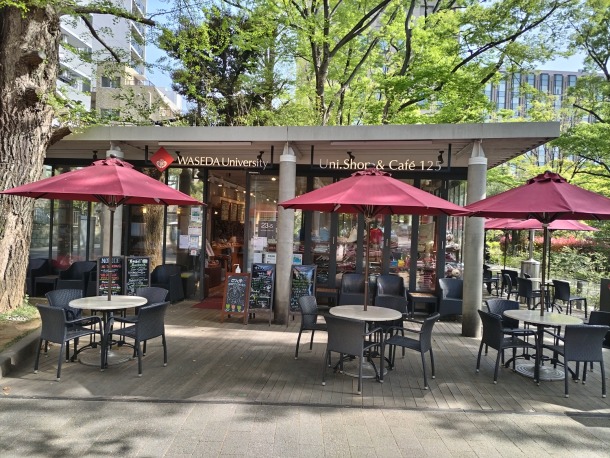 私たちはオフィシャルグッズの製造・販売を通じて、早稲田大学の価値をより一層高めるブランディングを担っています。またUni.Shop & Café 125は、校友の方々に来店いただくことがとても多いです。在学中はもちろん、卒業後も早稲田に関わる誰もが立ち寄れる皆さんのクラブハウスのような存在を目指していますので、これからもぜひ利用してください!
私たちはオフィシャルグッズの製造・販売を通じて、早稲田大学の価値をより一層高めるブランディングを担っています。またUni.Shop & Café 125は、校友の方々に来店いただくことがとても多いです。在学中はもちろん、卒業後も早稲田に関わる誰もが立ち寄れる皆さんのクラブハウスのような存在を目指していますので、これからもぜひ利用してください!
「仕事の相棒」:365日を共にする「ノートPC」
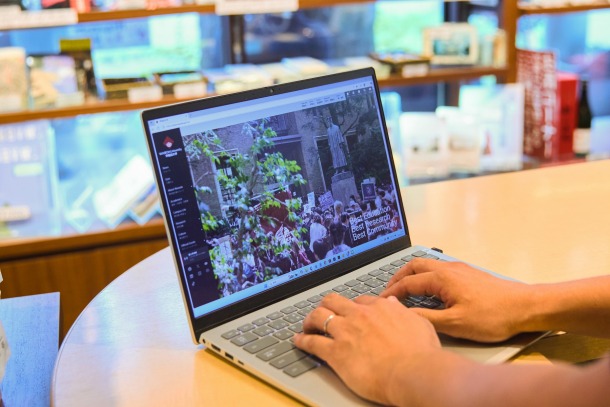
「業務の全てをこのノートパソコンに集約しているため、勤務中は1秒たりとも手放せません」(梶原さん)
【店名】Uni.Shop & Café 125
【場所】早稲田キャンパス 大隈講堂脇
【TEL】Uni.Shop 125:03-5291-7491/Uni.Café 125:03‐3208‐7350
【営業時間】8:30~19:30
【休業日】土・日・祝日も営業(夏季/年末年始を除く)
【Webサイト】https://unishop-cafe125.com/uni-shop125/
障がい者スタッフの成長を支える、「ポラリス」の要
株式会社早稲田大学ポラリス マネージャー 伴 麻子(ばん・あさこ)
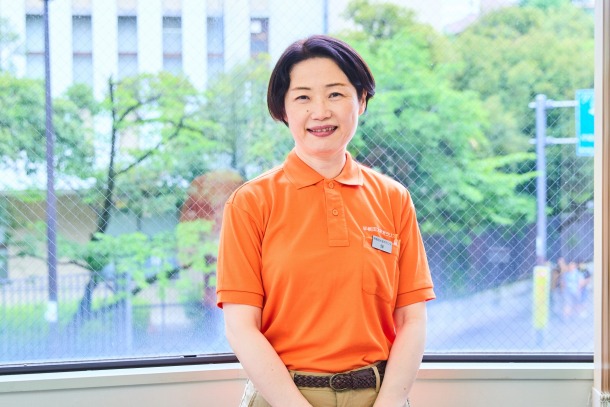
早稲田キャンパス 27-10号館(早稲田関口ビル)株式会社早稲田大学ポラリス事務所にて
 株式会社早稲田大学ポラリス:本学の障がい者雇用の促進と安定を図るために2007年に設立された大学初の特例子会社。現在、障がい者スタッフ32名、社員12名で、キャンパス内清掃や文書仕分け業務の他、使用済み乾電池分別、ペットボトル再生処理、文書スキャン業務、各種事務補助を行っている。ポラリス(Polaris)とは、こぐま座を構成する北極星を指すラテン語で、一人一人が星のように輝いて他者を照らし、集まって一つの美しい星座を形成してほしい、という思いが込められている。
株式会社早稲田大学ポラリス:本学の障がい者雇用の促進と安定を図るために2007年に設立された大学初の特例子会社。現在、障がい者スタッフ32名、社員12名で、キャンパス内清掃や文書仕分け業務の他、使用済み乾電池分別、ペットボトル再生処理、文書スキャン業務、各種事務補助を行っている。ポラリス(Polaris)とは、こぐま座を構成する北極星を指すラテン語で、一人一人が星のように輝いて他者を照らし、集まって一つの美しい星座を形成してほしい、という思いが込められている。――業務内容を教えてください。
私は障がい者スタッフと支援社員全体の活動を取りまとめるマネージャーの立場です。7時15分頃に出勤、予定確認とメールチェックをし、その日のTo Doを書き出します。8時になったら全員でラジオ体操をして、業務開始。午前中はスタッフの作業の様子や環境に問題がないか、各現場を巡回します。事務所に戻ると会議資料の作成など、午後からは打ち合わせや面談を行うことが多いです。学生や外部からの問い合わせ対応や、大学・グループ会社との調整などもあります。
――普段、学生に対してどのようなことを思いながら働いていますか?
一言で「応援したい」気持ちです。文書受付に届いた入学願書や奨学金申請の書類を取り扱う時、大切な学生証を学部ごとに仕分ける時、学内イベントの資料を封入する時、キャンパスや学生会館で日々清掃を行う時、入試当日、卒業式、入学式、早稲田祭、それ以外の普段の日々も、私たちは学生の皆さんの姿を思い浮かべながら、大切な1日をベストな状態で! と願って業務に取り組んでいます。早稲田で学ぶ時間は自分の軸を形作り、一生の宝になるものと思うと、応援したい気持ちが強くなります。
写真左:早稲田キャンパス内清掃の様子。障がい者スタッフと支援社員のチームで行動する
写真右:早稲田キャンパス1号館にある文書受付での、文書仕分け業務の様子。学内便と呼ばれる学内間の文書の他、書留を含む一般郵便物の仕分けと点検も行う
――仕事をしていて、どんなときにやりがいを感じますか?
スタッフの小さな成長を発見したときや、彼らが大学に貢献している実感を持てたときにやりがいを感じます。2019年度に始まったポラリス・学生交流公開講座で、「スタッフのあいさつや仕事ぶりから爽やかさや元気を受け取っている」と参加学生から聞いたり、ポラリスが担当した事務補助に対して「こんなにきれいに仕上げてくれて!」「クレーム対応が1件もなかった!」と職員の方から驚かれたりしたこともありました。私たちの地道な働きぶりが、大学と学生にとって良いものとして届いたことに深い喜びを感じます。
――学生に向けてメッセージをお願いします。
学生時代は人生の基礎を形作る時期だと思うので、自己投資をお勧めします。ワクワクする世界、美しい場所、おいしいもの、人に感動するなど、たくさんの経験をしてほしいです。時には傷ついたり、思うようにいかないもどかしさや自信をなくすこともあったりするかもしれませんが、それらもきっと財産になります。ポラリススタッフはいつも皆さんを応援する気持ちを持って仕事していることを、時々思い出してくれたらうれしいです。
「仕事の相棒」:季節の植物や果物、動物などジャンルも素材もさまざまな「ブローチ」
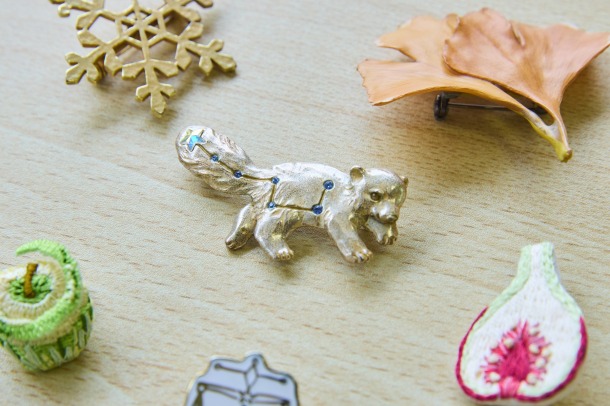
「毎日出勤する時に、コレクションの中から小さなブローチを一つ選んで身に着けます。『今日も1日がんばるぞ!』と、気持ちが整う気がします。勝負ブローチは、こぐま座の『ポラリス』!」(伴さん)
所沢キャンパスをつなぐ19台の連絡バス 安全・安心の運転士
所沢キャンパス連絡バス(スクールバス) 運転士 肥沼 誠(こいぬま・まこと)
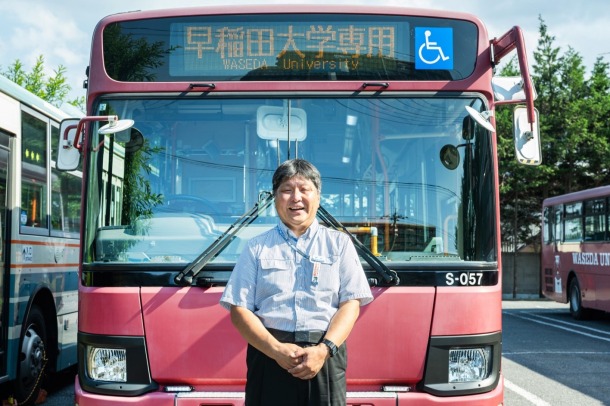
株式会社西武総合企画所沢センター(埼玉県所沢市)車庫にて
――業務内容を教えてください。
西武池袋線小手指駅と所沢キャンパスを結ぶ連絡バスは計19台あり、始発バスの出勤時間7時10分から最終の退勤時間22時30分の間を、27人の運転士でシフトを組んで運行しています。乗務前と後には、運行管理者から受ける法令で定められた点呼があり、健康状態や酒気帯び確認、車両の点検結果を報告します。運行中、何より優先すべきは事故防止。危険を予測し安全運転を心掛け、一運行ごとの車内点検も必須です。
――普段、学生に対してどのようなことを思いながら働いていますか?
私が働けているのは、通勤・通学している皆さんあってのことと感謝しています。時間帯によっては乗車まで長い時間待たせしてしまったり、車内混雑時に不快な思いをさせてしまったりすることがあり、申し訳ない気持ちです。少しでも快適に利用いただくため、車内温度の調整や、優しく丁寧な運転とアナウンスを心掛け、「安全・安心のバス」を提供できるよう、意識を持って運行しています。
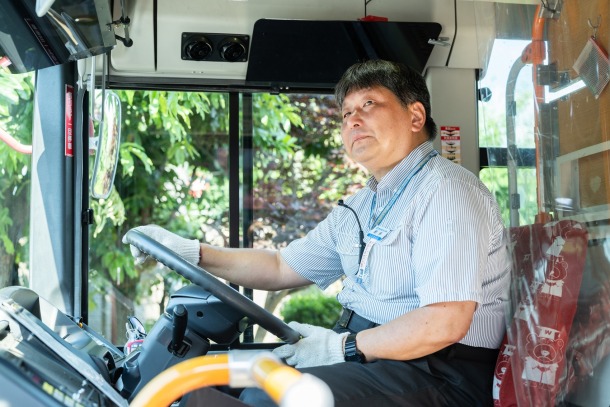
始発から最終までのシフトには、大まかに「朝~午後」「午後~夜」「朝~夜」など19の勤務パターンがある
――仕事をしていて、どんなときにやりがいを感じますか?
私のもう一つの仕事が、指導乗務員としての新人運転士の育成です。入社後は教官との基礎訓練を行い、その後営業所へ配属となり、私が同乗する路線研修を開始します。運行経路にあるさまざまな危険や対応法など、さらなる安全を求め「基本動作」を繰り返し学ぶのですが、晴れて独り立ちしたときには教える側としての達成感があります。また、皆さんの安全を守り続け、営業所で掲げた事故抑止目標を達成できた際にもひときわ喜びを感じます。
――学生に向けてメッセージをお願いします。
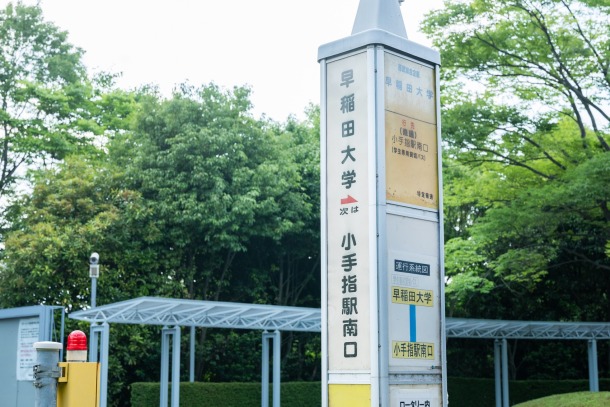 バス車両の入れ替えが進み、ワセダベア柄シートの車両も増えました。一部の座席には後ろ向きのワセダベアがいることを知っていますか? それぞれのバスで居場所が違うので、乗車の際にはぜひ探してみてください。また、降りる際には忘れ物がないよう、確認もお願いします。
バス車両の入れ替えが進み、ワセダベア柄シートの車両も増えました。一部の座席には後ろ向きのワセダベアがいることを知っていますか? それぞれのバスで居場所が違うので、乗車の際にはぜひ探してみてください。また、降りる際には忘れ物がないよう、確認もお願いします。
「仕事の相棒」:時間を正確に把握するための「電波時計」と注意を呼び掛ける「マイク」
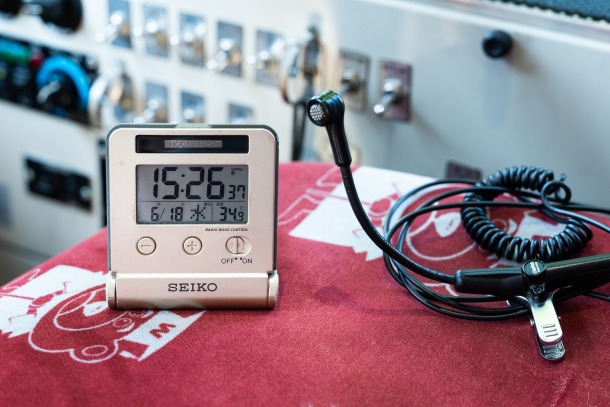
「指定の時刻・行き先に従って運行しますので、電波時計は欠かせません。また、道路交通の中で唯一バスは立ち席が認められ、シートベルト着用義務もありません。注意を呼び掛け皆さんを守るためのマイクも必須です」(肥沼さん)
自然との共生 環境保全の最前線で働く専門職員
所沢キャンパス自然環境調査室 専門嘱託職員 馬谷原 武之(まやはら・たけゆき)
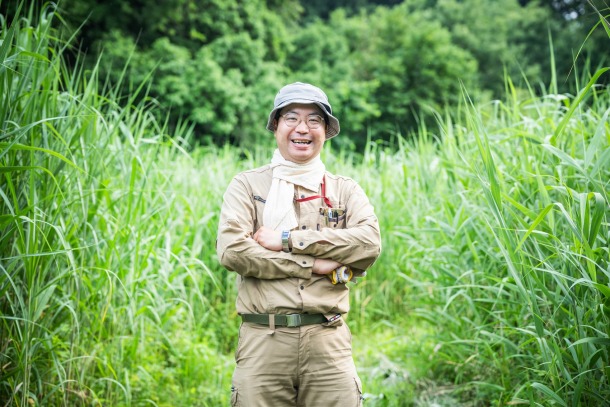
所沢キャンパス B地区保全エリアにて
――業務内容を教えてください。
所沢キャンパスが開設された1987年当時、地域や自然保護関連団体との協議の結果、所沢キャンパスは自然環境を保全した形で運営していくことが決まりました。実は、キャンパスは校舎やグラウンドがあるA地区と、湿地や雑木林といった里山の自然環境を保全している、普段立ち入ることのできないB地区に分かれています。私の業務は、B地区の里山的環境や動植物の保全管理、調査研究、関連ワークショップの開催や学内外での展示、関連会議への出席などです。また月に1回、学生ボランティアの主導により、地域の方々と湿地保全活動に関するワークショップも行い、補助しています。
――普段、学生に対してどのようなことを思いながら働いていますか?
保全エリアの横を通る学生がしばらくの間、野鳥の行動や湿地に生育する植物が風で揺れる様を眺めていることがありました。現在、人々の活動を続けていくために、自然環境との調和がなされる持続可能な社会の構築が進められていますが、まずはこのキャンパスで、樹木や鳥、昆虫など、身近な所から意識して親しむことができると良いと思います。何事にもさまざまな視点があるので、物事の背景を踏まえた上で、自分の意見や考え方を持つことができるようになってほしいです。
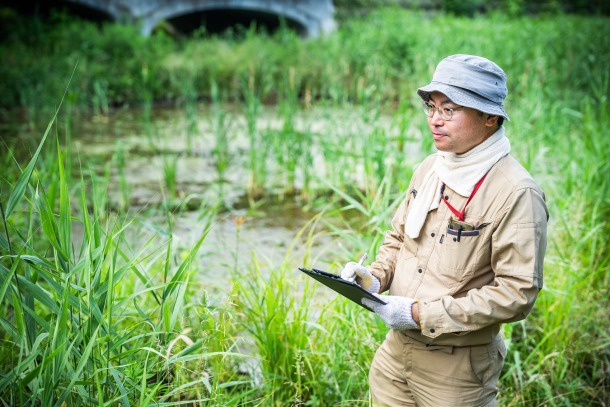
保全エリア内にある水田の脇で、調査の記録を取る様子
――仕事をしていて、どんなときにやりがいを感じますか?
人々の活動と密接した自然環境は、時代の変化や気候変動の影響を受け、日々状況が変化していきます。保全管理、調査研究、普及活動はつながっていて、調査研究の成果を保全管理に反映したり、さらに展示や見学、ワークショップなどの活動といった多くの方々への興味関心を深めていくことに発展したりしていきます。やりがいを感じるのは、日々の活動の中で、そのようなつながりを感じられた瞬間です。
――学生の皆さんにメッセージをお願いします。
現在、ネイチャーポジティブ(生物多様性の損失を止め、回復軌道に乗せること)が一般的な社会となりましたが、本学が長年にわたりこのキャンパスで先進的な取り組みを行ってきたという財産は、実は皆さんが誇れることの一つかもしれません。学生ボランティアによるワークショップは今年で22年目を迎えますが、関わった学生スタッフは延べ約1,500人、参加者は延べ約5,000人にもなります。見学の受け入れも行っていますので、連絡の上、ぜひ所沢キャンパスに来てください!
所沢キャンパス 自然環境調査室の外観(左)と、事務所内の様子(右)。事務所内の棚の上に置かれているはく製は、この地域に生息している動物。証拠資料としての意味があり、学内外での展示を行う際にも利用している(※クリックして拡大)
「仕事の相棒」:水田での作業時に必須の「胴長」
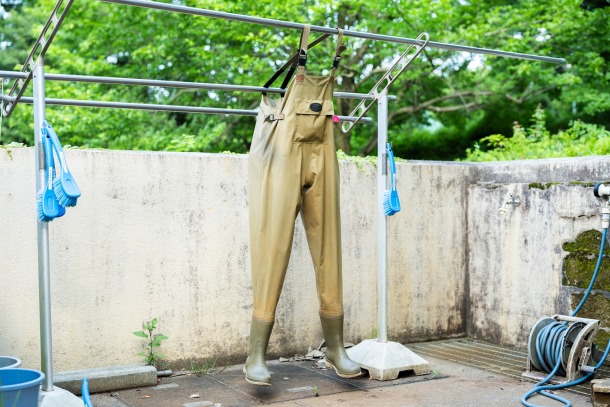
「長靴では深くて入れない池や河川、水田などで作業する時に使用します。特に保全エリア内の水田は湿田といわれる泥が深い水田で、胴長は必須です」(馬谷原さん)
2024年6月公開の記事も併せて参照してください!
撮影:番正 しおり、布川 航太
【次回Special Issue予告】2025年10月2日(木)公開「古着特集」

